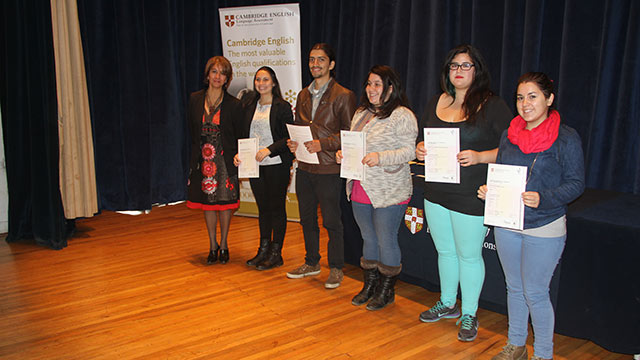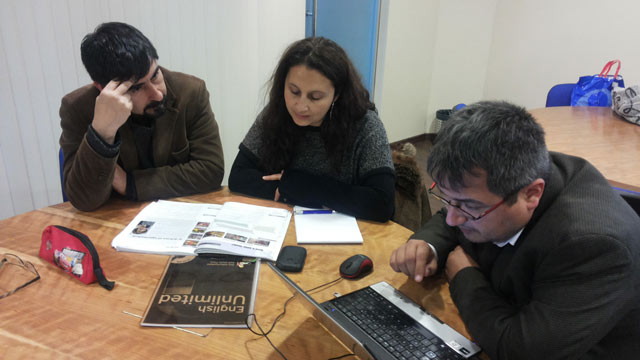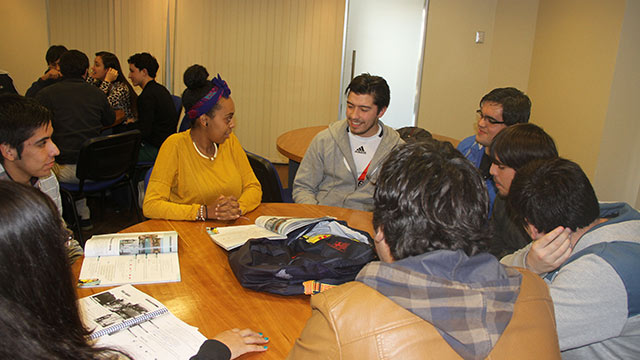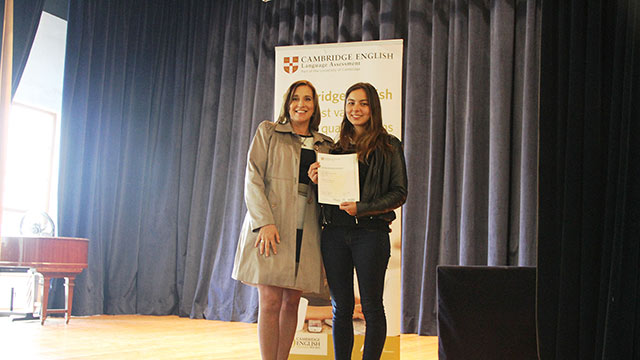At PUCV English language is not a barrier to project your future and grow in your work.
Open yourself up to countless opportunities around the world!
0
Number of courses
1
Number of students
0
Certified students
Since 2011 we are with you, every step of the way establishing a transversal path of English courses in all the curricula of the undergraduate training. PUCV has been recognised at an international level as an authorised centre in Cambridge (Centre CL304) allowing us to certify a total of 1.118 students at levels B1, B2 and C1 respectively, of the Common Framework of Reference for Languages.
OUR EVENTS
OUR COURSES
ING9000
CEFR Level: A1
Objectives
- Listening: To demonstrate comprehension of clear, slow, standard speech related to familiar everyday expressions and very basic phrases aimed at the satisfaction of needs of a concrete type.
- Reading: To infer and identify general and specific information from short, simple texts related to familiar everyday expressions and very basic phrases.
- Speaking: To interact in a simple way provided the other person talks slowly and clearly and is prepared to help. To introduce themselves and others and their immediate environment, ask and answer questions about personal details such as where he/she lives, people they know and things they have.
- Writing: To fill out a simple form, write a postcard or simple email.
UNITS
- Unit 1: “Hello”
- Unit 2: “All about me”
- Unit 3: “Food and drink”
- Unit 4: “My life and my family”
- Unit 5: “Places”
- Unit 6: “Work and Routines”
- Unit 7: “Shopping and fashion”
- Unit 8: “Past events”
ING9001
CEFR Level: A2
Objectives
- Listening: To demonstrate comprehension of clear, slow basic phrases related to familiar everyday expressions.
- Reading: To infer and identify general and specific information from short, simple texts related to familiar everyday expressions and very basic phrases aimed at the satisfaction of needs of a concrete type.
- Speaking: To interact in a simple way provided the other person talks slowly and clearly and is prepared to help. To introduce themselves and others and can ask and answer questions about personal details such as where they live, people they know and things they have.
- Writing: To fill out a simple form at sentence level or short paragraphs related to familiar topics.
UNITS
- Unit 0: “Welcome and Introduction”
- Unit 1: “People”
- Unit 2: “Work and study”
- Unit 3: “Daily Life”
- Unit 4: “Food”
- Unit 5: “Places”
ING9002
CEFR Level: A2
Objectives
- Listening: To demonstrate comprehension of clear, slow, standard speech related to areas of most immediate personal relevance (e.g. very basic personal and family information, shopping, local geography, and employment) and catch the main point in short, clear, simple messages and announcements
- Reading: To infer and identify general and specific information from short, simple texts containing high-frequency vocabulary and shared international expressions. Identify specific, predictable information in simple everyday material such as advertisements, prospectuses, and timetables.
- Speaking: To communicate in simple and routine tasks requiring a simple and direct exchange of information on familiar topics and activities. To handle very short social exchanges, even though they cannot usually keep the conversation going of their own accord. To use a series of phrases and sentences to describe in simple terms family and other people, living conditions, educational background, and present or most recent job.
- Writing: To write short, simple notes and messages relating to matters in areas of immediate need, linking a series of simple phrases and sentences with simple connectors like ‘and’, ‘but’ and ‘because’. To write a very simple personal letter, for example thanking someone for something.
UNITS
- Unit 6: “Family”
- Unit 7: “Trips”
- Unit 9: “Clothes and shopping”
- Unit 10: “Communication”
- Unit 11: “Entertainment”
ING9003
CEFR Level: B1
Objectives
- Listening: To demonstrate comprehension of clear, slow, standard speech related to areas of most immediate personal relevance (e.g. very basic personal and family information, shopping, local geography and employment) and catch the main point in short, clear, simple messages and announcements
- Reading: To infer and identify general and specific information from short, simple texts containing high frequency vocabulary and shared international expressions. Identify specific, predictable information in simple everyday material such as advertisements, prospectuses, and timetables.
- Speaking: To communicate in simple and routine tasks requiring a simple and direct exchange of information on familiar topics and activities. To handle very short social exchanges, even though they cannot usually keep the conversation going of their own accord. To use a series of phrases and sentences to describe in simple terms family and other people, living conditions, educational background and present or most recent job.
- Writing: To write short, simple notes and messages relating to matters in areas of immediate need, linking a series of simple phrases and sentences with simple connectors like ‘and’, ‘but’ and ‘because’. To write a very simple personal letter, for example thanking someone for something.
UNITS
- Unit 2: “Travel and tourism”
- Unit 3: “Money”
- Unit 4: “Social Life”
- Unit 5: “Work”
- Unit 6: “Problems and Advice”
ING9004
CEFR Level: B1
Objectives
- Listening: To demonstrate comprehension of main ideas and explicit information from instructions or public announcements and texts related to routines and familiar topics about everyday life.
- Reading: To infer and identify general and specific information from texts about routine information, and the general meaning of nonroutine information within a familiar area.
- Speaking: To describe events and express opinions on abstract/cultural matters in a limited way or offer advice within a known area.
- Writing: To write letters or make notes on familiar or predictable matters.
UNITS
- Unit 7: “Changes”
- Unit 8: “Culture”
- Unit 9: “Achievements”
- Unit 10: “Values”
- Unit 12: “Characters”








